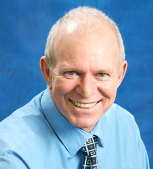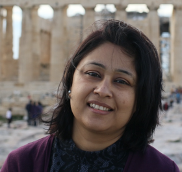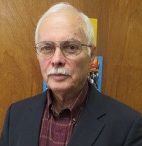The International Water Resources Association (IWRA) in collaboration with the Universities Partnership for Water Cooperation and Diplomacy (UPWCD), launched IWRA’s first online series of master classes on Water Cooperation & Diplomacy that took place during the months of July, September and early October in 2021.
The series of ten weekly classes were held for two and half hours each, divided into:
- Public lectures: A 90-minute session, freely accessible and open to all; followed by,
- Skill-building workshops: Each session ran for 60 minutes, only for IWRA Gold and Silver members, as well as UPWCD students and members.
Recordings and presentations available to IWRA members

Lecture Topic: Launching a Dynamic Decision Support Dashboard for Hydropolitical Multidisciplinary Analysis
Lecturers:
Mohammadreza Shahbazbegian is a trained expert specializing in hydropolitics and complex system dynamics modelling with robust publications in the fields. Throughout his career, he combined system dynamics with hydrolpolitics as an innovative approach to establish the “Hydropolitical Self-Organization” theory that contributes to hydropolitical situation analysis. On this basis, he is a co-leader of a joint research project between Tarbiat Modares University and the University of Geneva. The project’s title is “Launching a dynamic decision support dashboard for hydropolitical multidisciplinary analysis; The Helmand transboundary endorheic basin between Iran and Afghanistan”. Now, he is an assistant professor at Tarbiat Modares University, Tehran, Iran and the head of the interdisciplinary group of the water and technology department established in the university. He is the founder of the newly established association in Iran, namely the Iranian Association of Hydropolitics, under Iran’s ministry of science and technology. Recently, he has taken over as the association’s chief.
Anthony Turton has specialised in water as a national security issue and holds a professorship at the Centre for Environmental Management, University of Free State. His work has evolved into variations of a Hydropolitical Security Complex, where dominant forces of amity or enmity shape hydropolitical dynamics in transboundary rivers. He has linked up with Dr Shahbazbegian, in the development of mathematical models that can be used by negotiators as they assess options open to them. He served as Deputy Governor of the World Water Council and still serves as Editor for Africa on their official journal – Water Policy. He is currently part of a team creating a water technology hub and accelerator in the UAE, where developers can pitch their solutions to potential investors. He serves on the board of various companies dealing with water as a process fluid, nanotechnology and the role of big data in machine learning for the optimization of complex industrial processes. He holds a doctorate from the University of Pretoria and lives in Kwa-Zulu Natal.
Emerging new terms in water resources management literature such as water accounting, water laws, water diplomacy, virtual water, and water footprint confirm that management of water resources is shifting from water engineering to multidisciplinary knowledge. In that piece, Hydropolitics is one of the important concepts in the field of water resources management jointed with multidisciplinary knowledge such as international relations, economics, environments, politics et cetera to deal with transboundary water management as Elhance notes that hydropolitics as a discipline needs to deal with multidisciplinary issues and is an inherently complex subject of study. To analysis such complexity, the lecture dealt with:
- Gaining insights into the hydropolitics through a system lens
- Reviewing Hydropolitical drivers, Hydropolitical Security Complex(HSC) and Hydropolitical Complex(HC) theories
- Awareness of Hydropolitical Self-Organization (HSO) theory based on mixing hydropolitics and system dynamics and its application in making decisions for water cooperation among riparian states.
- Awareness of a decision-support tool based on HSO theory that enables negotiators to discuss hydropolitical multidisciplinary issues
Workshop details
At the end of the workshop, participants learned about:
-
- Causal Loop Diagrams(CLDs) and their dynamic behaviours produced overtime
- to map Casual Loop Digrams (CLD) according to the System dynamics’ rules for some case studies
- how to turn CLDs into Stock Flow Digrams (SFD)
- about Vensim software as a tool for mapping CLDs as well as simulating SFD
Interested in the workshops but not an IWRA member, sign up HERE.


Lecture Topic: International Water Law for Water Diplomacy
Lecturer:
Léna Salamé (L.L.M), is a lawyer in international public administration. She is a trained conflict manager and mediator.
After working 17 years in the United Nations, as the strategic and operational coordinator for the UN water conflict & cooperation programme, she is now affiliated to the Geneva Water Hub, a Swiss think tank that aims to promote water as a tool for peace by elaborating a “hydro-politic” agenda for action. She also serves as a Trustee for Water Witness International and is an active member of POINT a network of professionals and trainers in negotiation and dispute resolution.
A new global political water architecture is needed to ensure a consolidated and strong political governance for water within the SDGs and other international agendas.
The lack of trained professionals and delivery capacities is a recognized limitation towards attaining any meaningful Development Goal. This lecture was aimed at contributing to educating and training the next generation of water professionals in understanding and using international law as a means to nurture water cooperation. International law has however its limitations (due to various reasons) and its implementation is very much conditioned to the will of sovereign states. The lecture will also highlight such situations and how to address them.
Workshop details
At the end of the workshop, participants were able to:
• Name and understand the main principles of international water law, as well as the main tools codifying them
• Discuss and explain the main rights and obligations of sovereign States in terms of international water law
• Identify the limitations of international water law; and assess possible options to compensate for such limitations.
Take note: Workshops are only available to IWRA Gold and Silver members, as well as UPWCD students and members.
Interested in the workshops but not an IWRA member, sign up HERE.
Lecture Topic: Transboundary Waters and Benefit Sharing
Lecturer: Anamika Barua is a Professor in the Department of Humanities and Social Science, at Indian Institute of Technology Guwahati, in India. Trained in Ecological Economics, her research aims to understand the political, social and economic factors that shape environmental decisions and sustainability transition in developing economies. Using empirical approaches with a gender lens, she analyses how environmental impacts effects human wellbeing and development. Two of her recent work includes – climate change vulnerability assessment for adaptation planning in India and sustainable water resources management and governance through virtual water trade and game theory approach. She has published peer-reviewed articles in several leading international journals and have recently edited a book on ‘Climate Change Governance and Adaptation’ published by CRC press.
Lecture Objectives:
The lecture focused on transboundary water conflicts and cooperation bringing in two interesting approaches – virtual water trade and game theory. Both being economic mechanisms, the lecture highlighted the use of these approaches in transboundary water management and conflict resolution.
Virtual water trade (water embodied in products), can be used to reduce water conflicts by trading water intense commodities to water scarce region and thus reducing the pressure on the water resources. While virtual water has been extensively applied as a national water policy mechanism to mitigate national water deficit, this lecture highlighted the use of virtual water trade as a mechanism for conflict resolution in the context of transboundary waters.
Game theory, takes the realist approach to international relations and assumes that nation-states are motivated only by their own interests. But Game theory can be used as a strong mechanism for addressing transboundary water resources conflicts as it is multi-objective multi-agent interactive decision theory and deals with decision situations in which actors are not isolated, but are influenced by other actor’s decisions and actions. Using examples from real world scenarios (e.g. Brahmaputra River Basin), the lecture highlighted how interests, preferences, and available strategies affect transboundary interaction among rational players (nation states).
Workshop Details:
During the workshop, participants learned about:
- Transboundary interaction and the complex setting.
- Interests, priorities and strategies of national states that influences transboundary decision making
- Economic approaches in transboundary water management and conflict resolution.
- Analysing multi-criteria multi-decision maker interaction processes in transboundary context along with potential output.
Take note: Workshops are only available to IWRA Gold and Silver members, as well as UPWCD students and members.
Interested in future workshops but not an IWRA member, sign up HERE.


Lecture Topic: Water Diplomacy and adaptive governance at the U.S – Mexico border
Lecturers:
Robert G. Varady is a research Professor of environmental policy and past director of the Udall Center for Studies in Public Policy at the University of Arizona. He is also an adjunct research professor of arid lands studies in the School of Natural Resources and the Environment, and in the Department of Hydrology and Atmospheric Sciences. Varady’s work mostly has addressed environmental and water-management governance and policy in arid regions, with an emphasis on transboundary issues, especially along the U.S.-Mexico border. He has studied the history of global water initiatives, transboundary aquifer governance, and water security in Latin America. Varady has co-edited 13 books, monographs, digests, edited volumes, and journal special issues; and published more than 225 articles, book chapters, and reports on water and environmental governance, policy, and history. He is a Fellow Member of the International Water Resources Association and a past president of the International Water History Association (IWHA).
Stephen P. Mumme is a Professor of Political Science at Colorado State University, Fort Collins, Colorado. He is a leading authority on management of transboundary rivers linking the United States and Mexico along the international boundary and the work of the International Boundary and Water Commission, United States and Mexico. He is an affiliate faculty member of the School of Global Environmental Sustainability at Colorado State University and a Non-Resident Scholar at Rice University’s James A. Baker Institute for Policy Studies’ Mexico Center. His published work appears in numerous journals and popular press outlets. Recent publications include, “The 1944 Water Treaty, the Environment, and the Future of U.S.-Mexico Transboundary Water Governance,” Environmental Science & Policy (2020) and “On Quasi-Constitutional Treaties: The Case of Transboundary Freshwater Compacts,” Regions & Cohesion (Spring 2019).
Andrea K. Gerlak is a Professor in the School of Geography, Development and Environment and a Research Professor and Interim Director at the Udall Center for Studies in Public Policy at the University of Arizona. She has consulted on water governance and climate resilience efforts for UNESCO and the WMO. She serves as co-editor of the Journal of Environmental Policy and Planning. She has two decades of experience leading interdisciplinary environmental studies programs and university-community environmental partnerships. She is an author or coauthor of more than 100 publications. Her teaching and research addresses cooperation and conflict in water governance, including questions of equity, learning and adaptation.
This lecture had three parts:
1. A general introduction by Robert Varady, who framed the issue around science diplomacy and provided some context on the border region; followed by a discussion by Stephen Mumme on the diplomatic framework for binational water relations. (20 min.)
2. A presentation by Andrea Gerlak on issues in the Colorado River basin and delta region. (20 min.).
3. An analogous presentation by Mumme on issues in the Rio Grande/Río Bravo basin (20 min.).
This was followed by a 10-minute synthesis (by the three instructors) and a 20-min. open discussion.
Workshop details
The workshop also had three substantive parts, following a “set-the-stage” presentation by Varady. (5 min.)
- Mumme talked about the role and importance of archival research, looking at both structural issues regarding the treaty and context. (10 min.)
- Gerlak discussed the use of surveys of stakeholders and the role of informal mechanisms for science diplomacy. (10 min.)
- Varady described the importance of participation, specifically via convened science-policy dialogues and attendance at key events, including conferences. (10 min.)
Take note: Workshops are only available to IWRA Gold and Silver members, as well as UPWCD students and members.
Interested in the workshops but not an IWRA member, sign up HERE.
Lecture Topic: Technologies in Hydropolitics and Hydrodiplomacy
Lecturer: David Katz is a Senior Lecturer in the Department of Geography and Environmental Studies at the University of Haifa in Israel, and is currently on sabbatical at the Nicholas School of Environment at Duke University in the USA. He specializes in environmental and natural resource policy and economics. His research has focused on a range of topics including transboundary environmental and resource management, policy incentives for natural resource conservation, the relation between economic development and resource consumption, and valuation of ecosystem services.
Lecture Objectives:
This lecture demonstrated how new technologies are changing the dynamics of cooperation and conflict over shared water resources. It showed how technologies such as desalination, remote sensing, online sensors and machine learning are challenging traditional thinking on transboundary water resources, by expanding and creating new avenues of cooperation, “democratizing” data, building trust based on shared knowledge, and allowing development of better and more reliable modeling and forecasting. It also addressed the limitations and potential downsides of such “technical fixes.”
Workshop Details:
During the workshop participants learned about various online tools that can be used to help in retrieving and analyzing transboundary water data.
It also provided a simulation in which participants were able to explore how various technologies that could be integrated into negotiated solutions regarding shared water resources.
Take note: Workshops are only available to IWRA Gold and Silver members, as well as UPWCD students and members.
Interested in future workshops but not an IWRA member, sign up HERE.
Master classes that took place in July 2021
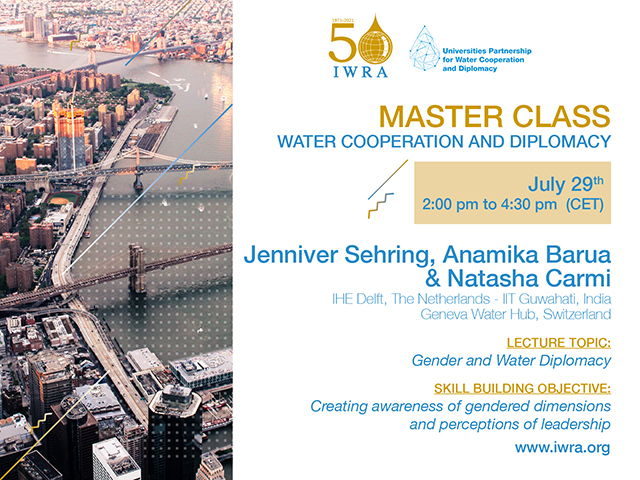
Lecture Topic: Gender and Water Diplomacy
Lecturers:
Jenniver Sehring is a Senior Lecturer in Water Governance and Diplomacy at IHE Delft Institute for Water Education in the Netherlands. She coordinates the master programme “Water Cooperation and Diplomacy” as well as the DUPC2 Water Diplomacy Programme, and is an editor of the Central Asian Journal of Water Research (CAJWR).
Natasha Carmi is the Lead Water Specialist at the Geneva Water Hub since March 2018, and contributes to the establishment of the Global Water Observatory on Water and Peace, as well as the development of the women, water and peace agenda. Prior to that, she worked as policy advisor on water, environment and agriculture to the Palestinian Negotiations Support Project, working closely with decision makers, and has experience in bilateral and regional water negotiations.
Anamika Barua is a Professor in the Department of Humanities and Social Science, at Indian Institute of Technology Guwahati, in India. Trained in Ecological Economics, her research aims to understand the political, social and economic factors that shape environmental decisions and sustainability transition in developing economies.
Water cooperation and diplomacy exist at the intersection of two policy fields that have been dominated by men: international relations and water resources management. Not only are women underrepresented in decision-making positions, also the processes, norms and policy priorities in water cooperation are highly gendered.
The lecture looked at how gender impacts water diplomacy processes and at the challenges and opportunities for increasing women’s participation in transboundary water cooperation at both national and regional levels.
The skills-building workshop created awareness about the linkages between gender and leadership, focused on specific skills for negotiation, and provided practical tips and examples for increasing women’s participation and voice in water diplomacy.
Take note: Workshops are only available to IWRA Gold and Silver members, as well as UPWCD students and members.
Interested in other workshops but not an IWRA member, sign up HERE.
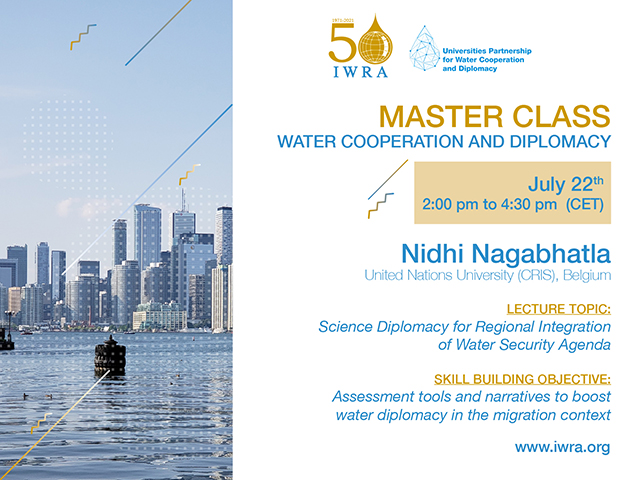

Lecture Topic: Science Diplomacy for Regional Integration of Water Security Agenda

Lecturer: Dr Nidhi Nagabhatla is a Senior Fellow with the UN University Institute on Comparative Regional Integration Studies (UNU-CRIS), Belgium. A sustainability science specialist with over 20 years of work experience, she led, coordinated, and implemented trans-disciplinary projects in various geographical regions of Asia, South Africa, Europe, and Americas working with international organizations viz., IWMI, World Fish Centre, IUCN, Asia Pacific Climate Center, and UN’s University (INWEH) leading research and capacity development initiatives. She is also affiliated with leading academics institutes: Oxford University (UK); Leibniz University (Germany), McMaster University (Canada) and Universidad Mayor de San Andrés (Bolivia) in research/professorship role toward sustainability research and science-policy interfacing and mentoring young professionals.
She serves as the chair of The Partnership for Environment and Disaster Risk Reduction (UNEP) and co-leads the ‘Water and Migration Working Group’ of FAO. Key areas of her research includes: environmental security, climate change adaptation, water and food security, environmental migration.
Focus of the lecture was:
a) What is science diplomacy?
b) Science diplomacy and water management in transboundary context.
c) Regional water governance and hydro diplomacy narratives.
d) Conflict settings, cultural diplomacy, regional integration, and political stability- new avenues for science diplomacy explained using the Lake Chad and the Congo Basin case study.
Useful Links:
- cris.unu.edu/tools-eu-science-diplomacy
- www.sciencedirect.com/science/article/abs/pii/S1462901121000903ok
Workshop details:
Assessment tools and narratives to boost water diplomacy in the migration context.
Water-related triggers and consequences of human displacement, as well as the scale of migration in the developing world, are aspects that are less visible in global migration and diplomacy discourse. We need to fill these gaps.
The workshop discussed an assessment of frameworks for water-migration nexus focusing on scenarios and case studies where water crisis is manifested as/via:
a) Water quality challenges
b) Water Quality settings – too much or too less water
c) Water extreme conditions – floods and droughts.
Participants jointly explored three case studies (Lake Chad, Aral Sea and Congo Basin) to understand multidimensional interlinkages between water- climate change impacts- conflict and migration nexus.
Useful Links:
- Migration and Water: A Global Overview – UNU-INWEH
- Water, Climate, Conflict, and Migration: Coping with One Billion People on the Move by 2050 – Our World (unu.edu)
Take note: Workshops are only available to IWRA Gold and Silver members, as well as UPWCD students and members.
Interested in future workshops but not an IWRA member, sign up HERE.
Lecture Topic: Approaching the SDGs as a System- Basic Observations

Lecturer: Professor János Zlinszky is an Associate Professor at the Department for Water Policy and Environmental Policy, University for Public Service (UPS), and at the Department for Environmental Law, Péter Pázmány Catholic University, both Budapest, Hungary. In addition to teaching courses in sustainable development and international environmental policy, he is also responsible for the MSc in Transboundary Water Management and Water Diplomacy at UPS.
As the global water crisis unfolds, development programs also turn to water provision as an issue. Building on the Millennium Development Program (2000-15), the Sustainable Development Goals (2015-2030) – the present policy for global eco-social transformation – increased the profile of water. But how do you approach a to-do-list of 169 items?
Water has a dedicated SD Goal – is it therefore a “vertical” issue? Whose opinion about water should prevail: civil engineers, farmers, mayors, disaster prevention, tourism, health, ecology? Where is the right vantage point, could there be guidelines?
This Master Class will followed a discussion based on the above questions. Diplomacy starts with the ability to observe, understand, and to never exclude one more possibility to explain something.
Workshop:
As experts and as negotiators, we develop the ability to concentrate, to focus, to follow instructions.
We develop useful habits to deal with frequent, familiar situations.
But, in the face of the obvious, can we allow for unexpected options? Can we keep an open mind? This simple, interactive practical assisted participants in getting inside such situations, through experience and a discussion on these questions.
It also enabled participants to pick up these tools for later use.
Take note: Workshops are only available to IWRA Gold and Silver members, as well as UPWCD students and members.
Interested in the workshop but not an IWRA member, sign up HERE.


Lecture Topic: Concepts in Economics & Strategic Behavior for Management of International Water

Lecturer: Professor Ariel Dinar is Distinguished Professor of Environmental Economics and Policy at the School of Public Policy, University of California, Riverside, USA. He served as lead economist on water and climate change for the World Bank. He is the Editor-in-Chief of the journal Water Economics and Policy.
This master class described economic and strategic concepts of cooperation and how they are related to various river basin case studies. In addition, the lecture presented and discussed several global studies where the concept of cooperation was analyzed. Lastly, the lecture concluded with a class discussion on pros and cons of use of economics in measuring international water cooperation.
• Participants learned how to identify factors in river basins that could affect both positively and negatively the likelihood for cooperation among riparian states
• Participants acquired the understanding of ranking (qualitatively) the relative importance of each of the factors and how to take such information into account in order to increase likelihood of cooperation.
Take note: The IWRA Master classes’ workshops are only available to IWRA Gold and Silver members, as well as UPWCD students and members.
Interested in future workshops but not an IWRA member, sign up HERE.
Lecture Topic: Introduction to Water Cooperation & Diplomacy

Lecturer: Professor Aaron T. Wolf is a Professor of Geography at Oregon State University, USA, with an appointment as professor of Water Diplomacy at IHE-Delft Institute for Water Education in the Netherlands.
This master class consisted of a presentation that surveyed the history of water conflicts and cooperation, and how tools of water cooperation and diplomacy can enhance dialogue between co-riparians. The class was followed by a skill – building workshop for IWRA Gold and Silver members, as well as UPWCD students and members.
Water Diplomacy refers to all positive interactions among actors concerned with the management of shared water resources that aim to achieve peaceful and sound management of such resources. While practicing water diplomacy, such actors try to influence each other’s opinions, perceptions of facts, positions and interests to negotiate towards a mutually accepted solution concerning shared resources.
This series of Master Classes addressed the above issues, and helped develop skills relevant to water diplomacy. Experts from around the world participated and classes were closely linked to each expert’s style and methodology, as well as to the distinct characteristics of each subject matter.
Recordings and presentations available to IWRA Members
Become an IWRA member, if you are not one already, so you can engage fully on these and other upcoming events and, of course, enjoy all the usual benefits of IWRA membership!
In case of any questions, please contact us at office@iwra.org or visit www.iwra.org.


